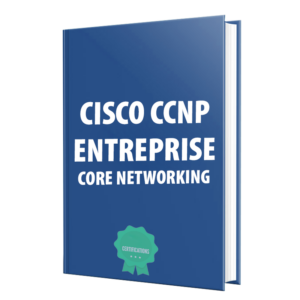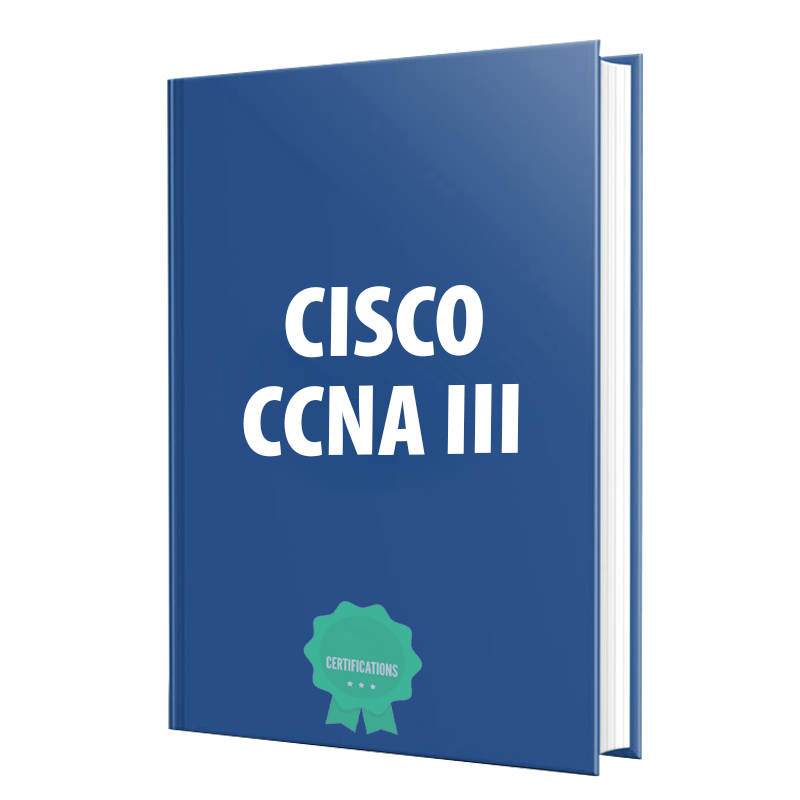The Cisco CCNA III Certification is the third level of the Cisco Certified Network Associate (CCNA) series, designed to deepen the technical expertise of IT professionals in networking and network security. This certification focuses on advanced networking concepts, including IP routing, network design, and the implementation of scalable network infrastructure. It is ideal for professionals who wish to develop specialized knowledge in network administration, security, and management, and those aspiring to pursue career advancement in network operations or infrastructure design.
CERTIF – CISCO CCNA III – RESEAU, SECURITE ET AUTOMATISATION D’ENTREPRISE (ENSA)
Categories:
CISCO, NOS CERTIFICATIONS
CORE OBJECTIVES
1. Advanced Networking and Routing
- – IP Routing Protocols : Teach advanced routing concepts such as OSPF, EIGRP, and BGP to enable the construction of scalable, efficient networks.
- – VLSM and CIDR : Focus on Variable Length Subnet Masking (VLSM) and Classless Inter-Domain Routing (CIDR) techniques to optimize IP address utilization.
- – Inter-VLAN Routing : Equip students with the knowledge to configure and troubleshoot Inter-VLAN routing for communication across different VLANs.
2. Network Security and Management
- – Network Security Fundamentals : Provide students with a foundation in firewall configuration, access control lists (ACLs), VPN technologies, and security protocols.
- – Secure Routing and Switching : Teach security policies in router and switch configurations to protect against vulnerabilities.
- – Intrusion Detection and Prevention : Introduce IDS/IPS techniques to identify and mitigate network security threats.
3. WAN Technologies and Implementation
- – WAN Fundamentals : Implement Wide Area Networks (WAN) using PPP, Frame Relay, and MPLS.
- – VPN Configuration : Configure and troubleshoot site-to-site and remote-access VPNs for secure connectivity.
- – WAN Optimization : Improve WAN performance using data compression, traffic shaping, and WAN acceleration.
4. Network Troubleshooting and Diagnostics
- – Advanced Troubleshooting Techniques : Use tools such as ping, traceroute, and protocol analyzers to diagnose network issues.
- – Layered Troubleshooting : Focus on troubleshooting across OSI layers, including Layer 2, Layer 3, and Layer 4.
- – Fault Isolation : Develop systematic approaches to isolate and fix network failures efficiently.
5. IP Addressing and Subnetting
- – Advanced IP Addressing : Learn subnetting, IP allocation, and hierarchical network design for optimal IP space usage.
- – Subnetting Algorithms : Master efficient subnetting and IP addressing planning techniques.
- – IPv6 Implementation : Understand IPv6 address formats, prefix notation, and transition strategies from IPv4 to IPv6.
6. Network Design and Architecture
- – Scalable Network Design : Learn to design scalable networks that support future growth.
- – Redundancy and Load Balancing : Implement redundancy and load balancing for network reliability.
- – Network Automation : Explore automation tools such as Cisco DNA and SD-WAN for efficient network management.
7. Cloud and Virtualization Technologies
- – Cloud Computing : Understand cloud models (SaaS, PaaS, IaaS) and their impact on networks.
- – Network Virtualization : Deploy virtual networks, virtual switches, and NFV in modern data centers.
- – Software-Defined Networking (SDN) : Manage networks using centralized controllers and software interfaces.
8. Preparation for Cisco Certification Exam
- – Exam Preparation : Participate in review sessions, practice exams, and hands-on labs for CCNA III certification.
- – Skills Assessment : Evaluate knowledge through assessment tools to identify areas for improvement.
- – Practical Labs : Engage in lab exercises to simulate real-world networking environments.
CAREER OPPORTUNITIES
1. Network Engineer
- – Network Infrastructure : Design, implement, and manage networking infrastructure for organizations, ensuring efficient connectivity and secure network operations.
2. Network Security Engineer
- – Security Implementation : Implement and maintain security protocols to safeguard network infrastructure against potential threats, including firewalls, VPNs, and intrusion prevention systems.
3. Systems Administrator
- – Networked Systems Management : Manage networked systems, servers, and infrastructure, ensuring smooth operation and optimization of IT resources.
4. IT Support Specialist
- – Technical Support : Provide technical support for network and IT systems, diagnosing and troubleshooting issues related to network connectivity, configuration, and hardware.
5. Cisco Certified Network Associate (CCNA)
- – Cisco Networking : Work in roles that require specialized Cisco networking knowledge, such as network design, security implementation, and infrastructure management.
6. Network Architect
- – Large-Scale Network Design : Plan, design, and implement the architecture of large-scale networks, ensuring scalability, reliability, and security for organizations’ global operations.
7. Wireless Network Engineer
- – Wireless Connectivity : Design and manage wireless networks, including Wi-Fi and cellular data networks, ensuring strong coverage, security, and seamless connectivity.
8. Cloud Network Engineer
- – Cloud-Based Solutions : Work with cloud services and virtualized networks, implementing cloud-based solutions and managing network performance and security in cloud environments.
9. Telecommunications Engineer
- – Telecommunication Systems : Manage telecommunication systems and infrastructure, including voice, data, and video networks, to support effective communication within organizations.
10. IT Consultant
- – IT Infrastructure Optimization : Provide expert guidance on networking and security technologies, helping organizations optimize their IT infrastructure and ensure efficient network operations.
Related products
-

CERTIF – CISCO CCNP ENTREPRISE : ROUTAGE ET SERVICES AVANCES (ENARSI)
-

CERTIF – LPIC 1 LINUX ADMINISTRATOR
-

CERTIF – CISCO CCNAV7 : INTRODUCTION AUX RESEAUX (ITN) – CCNA I
-

EXECUTIVE MBA IN BUSINESS ADMINISTRATION
-

CERTIF – ORACLE CERTIFIED ASSOCIATE OCA
-

CERTIF – HCIA HUAWEI CERTIFIED ICT ASSOCIATE – ROUTING & SWITCHING
-

EXECUTIVE CERTIFICATION IN GLOBAL MANAGEMENT
-

CERTIF – CISCO CCNP ENTERPRISE : CORE NETWORKING
